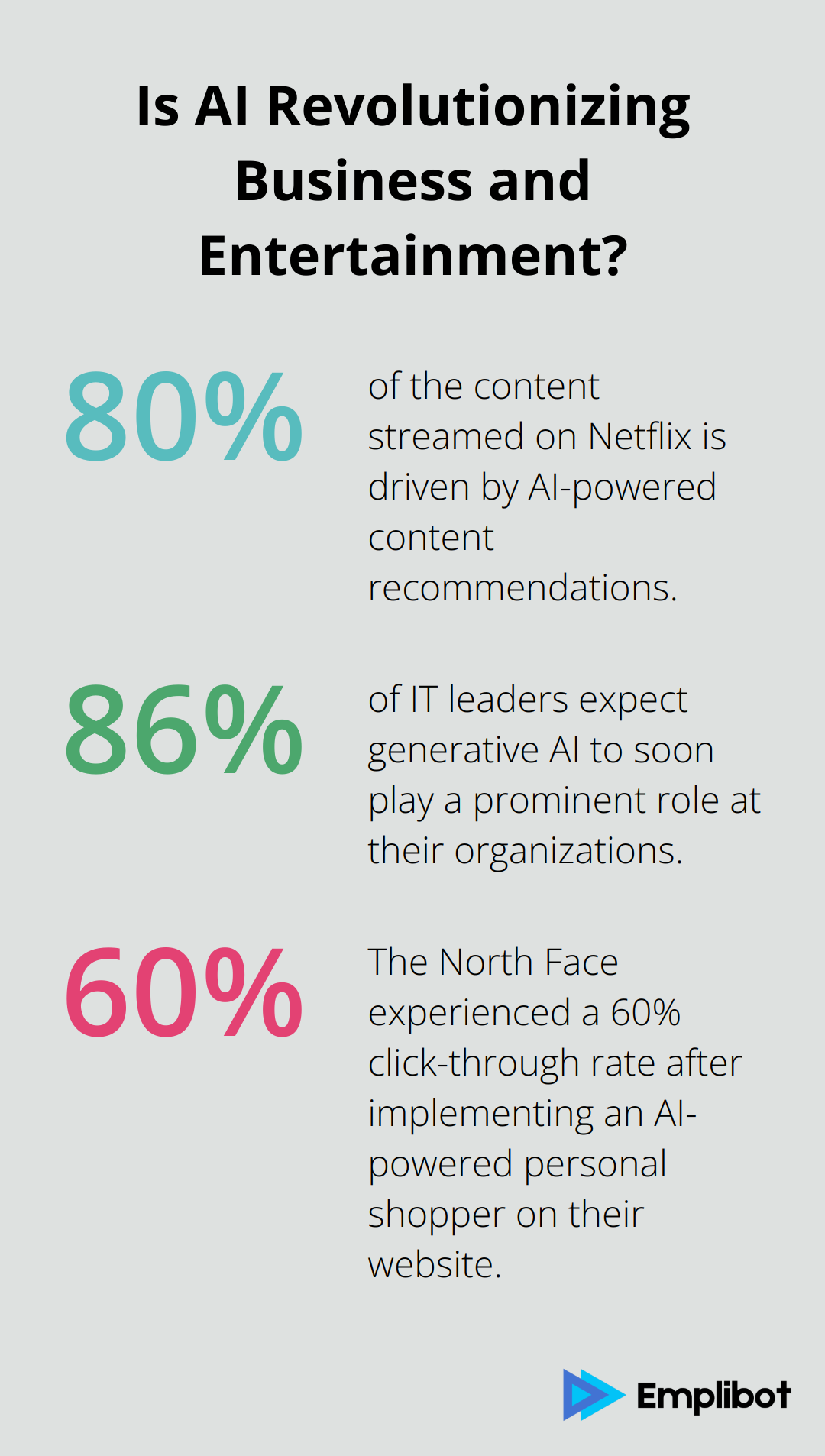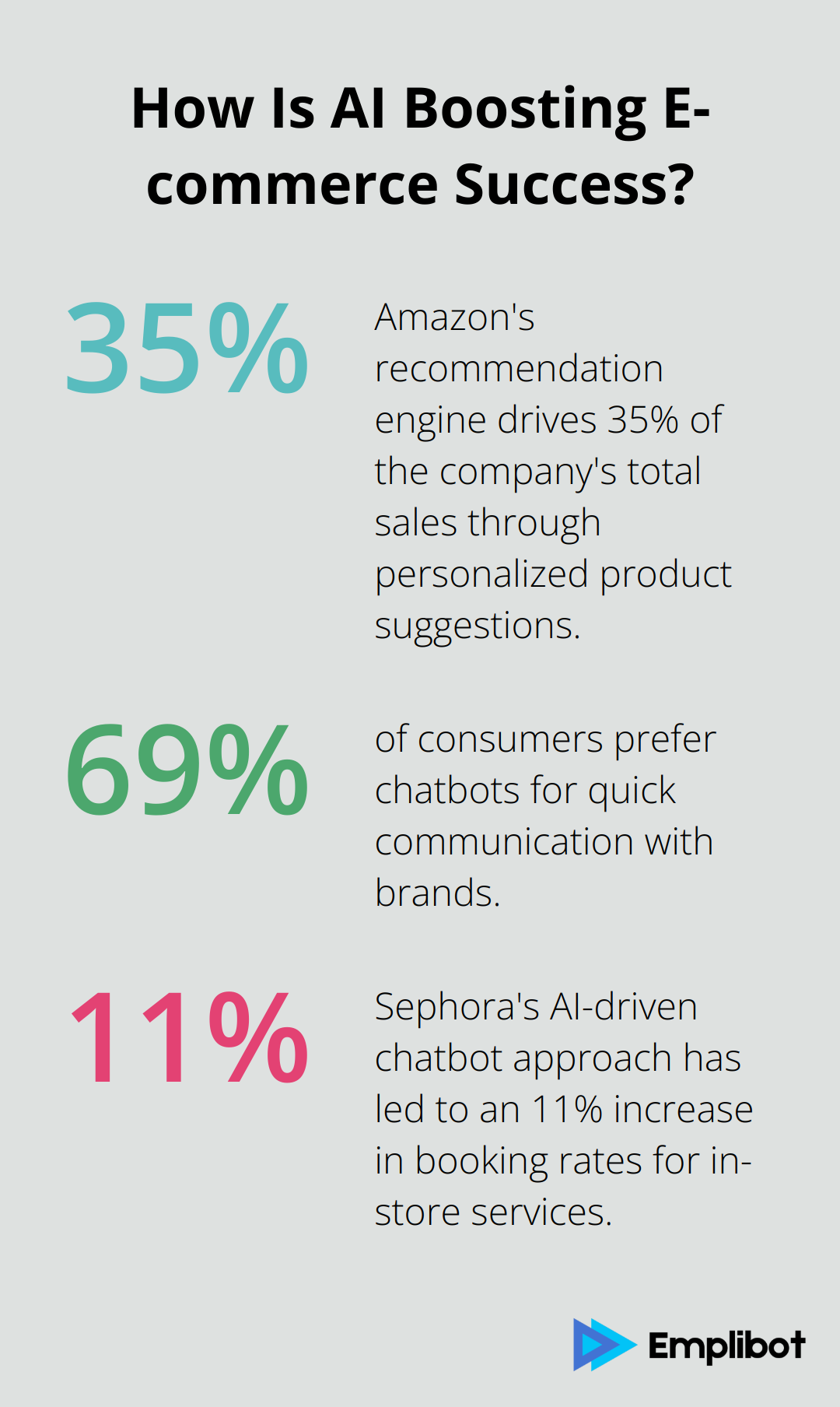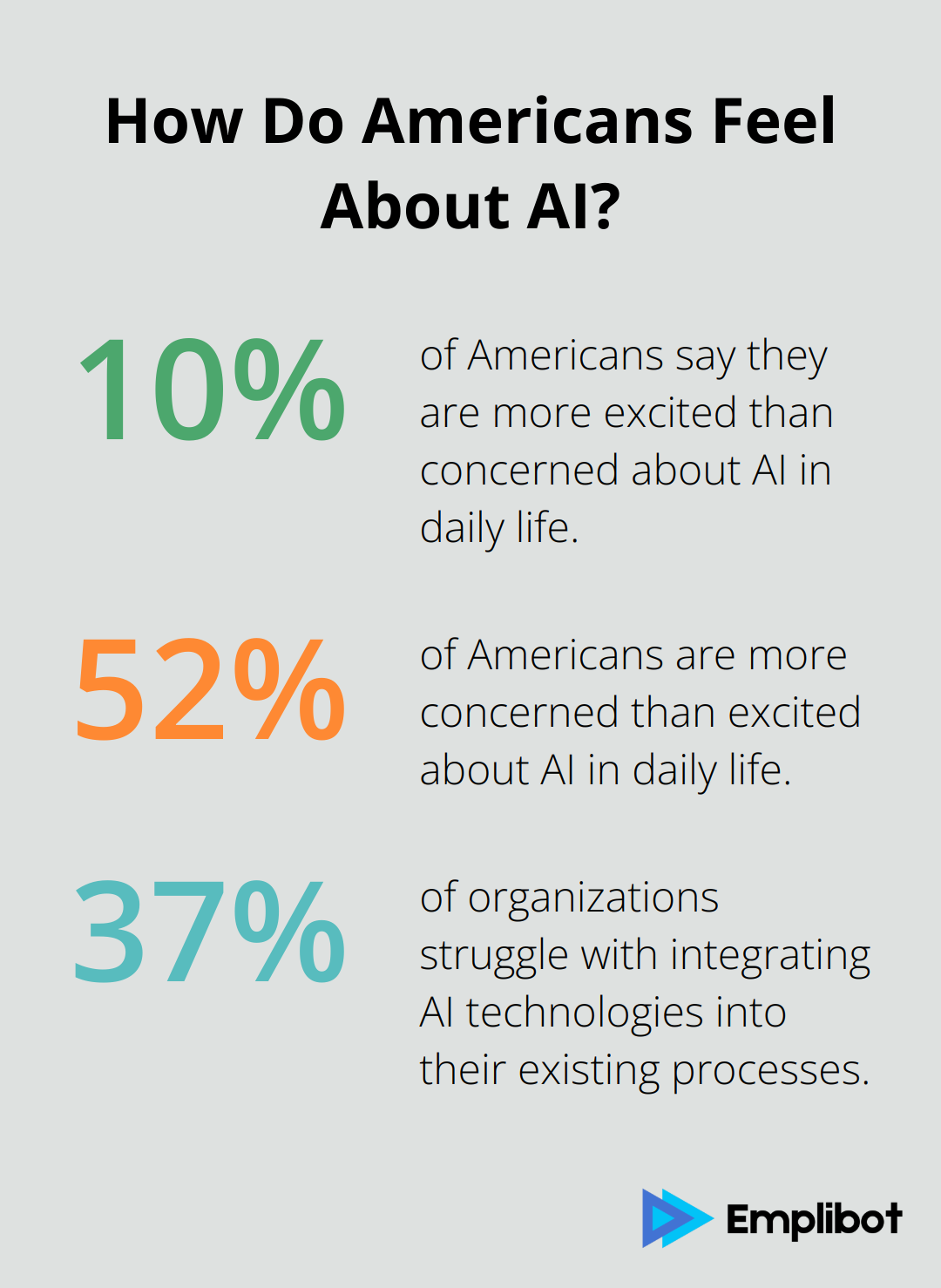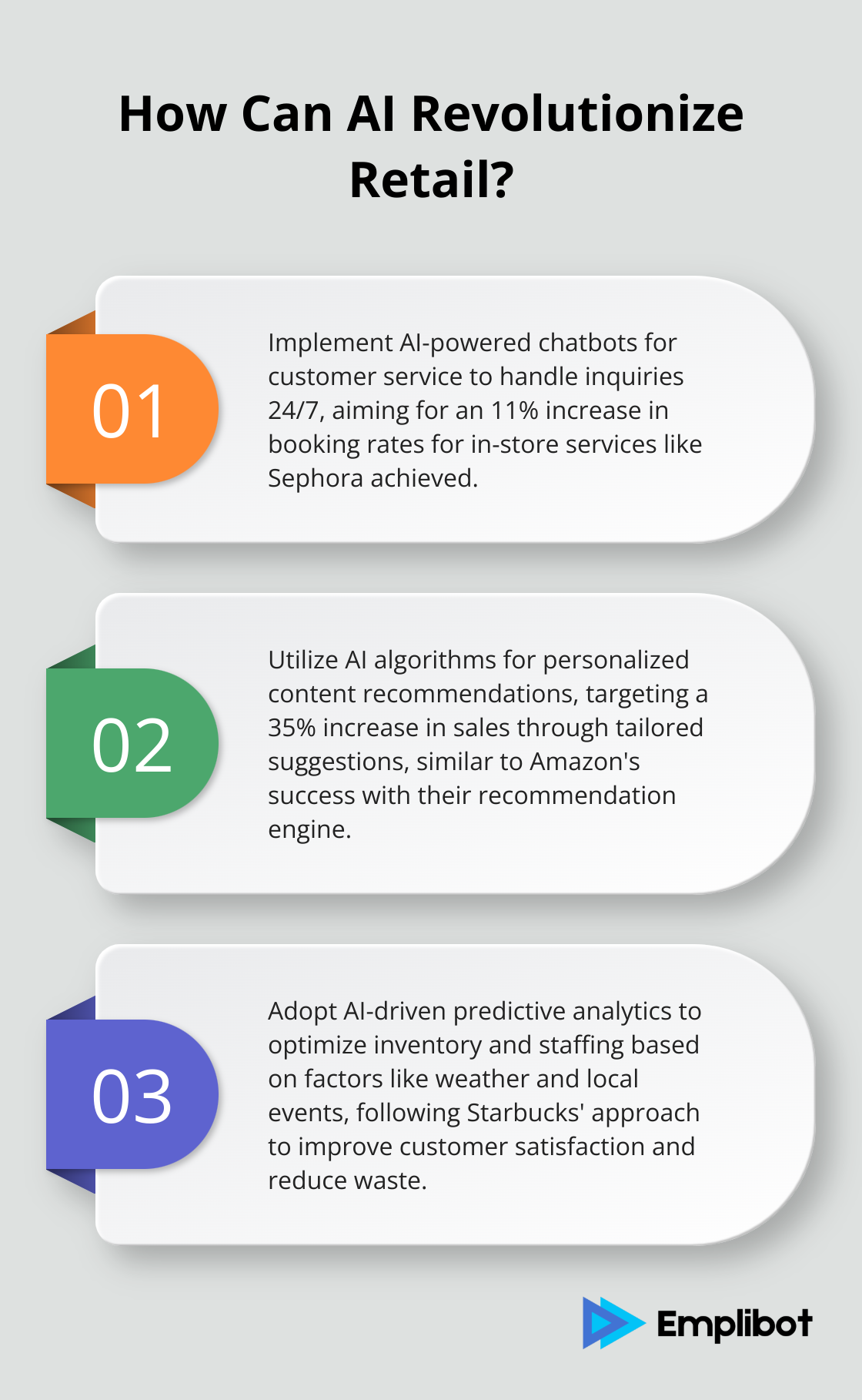At Emplibot, we’re witnessing a seismic shift in the marketing landscape. The question on everyone’s mind is: “Will marketing be replaced by AI?”
This blog post dives into the current state of AI in marketing, exploring its strengths, limitations, and potential future impact. We’ll examine how AI is reshaping marketing strategies and what it means for professionals in the field.
Contents
ToggleHow AI Transforms Marketing Today
The AI-Powered Marketing Revolution
The marketing landscape undergoes a radical transformation, driven by the rapid advancement of artificial intelligence. AI reshapes marketing strategies and execution, ushering in a new era of efficiency and precision.
AI Marketing Tools: A Booming Market
The market for AI-powered marketing tools experiences explosive growth. The global artificial intelligence market size was estimated at USD 196.63 billion in 2023 and is projected to grow at a CAGR of 36.6% from 2024 to 2030. This surge reflects the increasing adoption of AI technologies across various marketing functions.

Popular AI marketing tools include:
- Chatbots for customer service and lead generation
- Predictive analytics platforms for customer behavior forecasting
- Content creation and optimization tools
- Personalization engines for tailored customer experiences
- AI-powered social media management systems
AI’s Expanding Role in Marketing Tasks
AI takes on an increasingly significant role in handling various marketing tasks. According to Salesforce, 86% of IT leaders expect generative AI to soon play a prominent role at their organizations. Key areas where AI makes a substantial impact include:
- Content Creation: AI-powered tools generate blog posts, social media content, and video scripts, significantly speeding up the content production process.
- Customer Segmentation: AI algorithms analyze vast amounts of customer data to create highly targeted segments for more effective marketing campaigns.
- Ad Optimization: AI systems continuously analyze ad performance and make real-time adjustments to improve ROI.
- Email Marketing: AI tools personalize email content, optimize send times, and predict customer responses to improve open and click-through rates.
- SEO: AI-powered SEO tools analyze search trends, optimize content, and provide actionable insights for improving search rankings.
Real-World Success Stories
The impact of AI on marketing extends beyond theory, with many companies already reaping the benefits. Notable success stories include:
- Starbucks: The coffee giant uses AI to analyze customer data and provide personalized product recommendations, resulting in a 150% increase in email redemptions.
- The North Face: By implementing an AI-powered personal shopper on their website, The North Face saw a 60% click-through rate and a 75% conversion rate increase.
- Sephora: Their AI-powered chatbot helped increase bookings for in-store makeover appointments by 11%.
- Netflix: AI-driven content recommendations account for 80% of the content streamed on the platform, significantly boosting user engagement and retention.
These success stories underscore the transformative power of AI in marketing. The strategic integration of AI tools into marketing strategies (while maintaining the human touch) proves essential for businesses of all sizes.
As AI continues to evolve and reshape the marketing landscape, it’s important to examine the specific areas where AI excels in marketing. The next section will explore these strengths in detail, shedding light on how AI enhances data analysis, personalization, content creation, and more.
Where Does AI Truly Shine in Marketing?
AI’s impact on marketing transforms how businesses connect with their audiences. This chapter explores the areas where AI excels in marketing, supported by concrete examples and statistics.
Unparalleled Data Analysis and Customer Insights
AI processes vast amounts of data at lightning speed, providing marketers with unprecedented insights into customer behavior. A study by McKinsey reveals that companies using AI-powered marketing analytics see up to a 15-20% increase in marketing ROI. This boost stems from AI’s ability to identify patterns and trends that humans might overlook.

AI tools analyze customer purchase history, browsing behavior, and social media interactions to create detailed customer profiles. These profiles enable marketers to tailor their strategies with pinpoint accuracy. Amazon’s recommendation engine exemplifies this, driving 35% of the company’s total sales through personalized product suggestions.
Hyper-Personalization at Scale
AI elevates personalization by creating individualized experiences for millions of customers simultaneously. Netflix uses AI algorithms to personalize 80% of the content shown to its users, resulting in a significant increase in viewer engagement and retention.
Marketers can use AI-powered tools to:
- Customize email content based on individual preferences and behaviors
- Tailor website experiences in real-time
- Personalize product recommendations across various channels
The results speak volumes: Epsilon research found that 80% of consumers are more likely to make a purchase when brands offer personalized experiences.
AI-Driven Content Creation and Curation
AI changes the game for content creation, a traditionally time-consuming task for marketers. Tools powered by natural language processing (NLP) generate blog posts, social media updates, and even video scripts in a fraction of the time it takes human writers.
While AI-generated content still requires human oversight, it significantly speeds up the content creation process. The Washington Post uses an AI tool called Heliograf to create short news articles and social media posts, producing over 850 articles in its first year of implementation.
Moreover, AI excels at content curation, helping marketers identify and share relevant third-party content with their audience. This not only saves time but also ensures a steady stream of engaging material for social media channels and newsletters.
24/7 Customer Service with AI Chatbots
AI-powered chatbots revolutionize customer service in marketing. These virtual assistants handle customer inquiries around the clock, providing instant responses and freeing up human agents to focus on more complex issues.
A report by Juniper Research predicts that chatbots will save businesses $8 billion annually by 2022. Moreover, 69% of consumers prefer chatbots for quick communication with brands (according to a Salesforce survey).
Sephora’s chatbot helps customers find the right products, book in-store appointments, and even virtually try on makeup. This AI-driven approach has led to an 11% increase in booking rates for in-store services.
Predictive Analytics for Future-Proof Strategies
AI’s predictive capabilities allow marketers to anticipate future trends and customer behaviors. By analyzing historical data and current market conditions, AI can forecast everything from customer churn to product demand.
Starbucks uses AI to predict customer orders based on factors like weather, time of day, and local events. This allows them to optimize inventory and staffing, resulting in improved customer satisfaction and reduced waste.
In advertising, predictive analytics helps marketers optimize ad spend. Google’s Smart Bidding uses machine learning to adjust bids in real-time based on the likelihood of conversion, leading to improved ROI for advertisers.
While AI brings immense value to marketing, it’s not without its limitations. The next section will explore the challenges and constraints of AI in marketing, providing a balanced view of this transformative technology.
The AI Marketing Paradox: Limitations and Challenges
The AI Marketing Paradox: Limitations and Challenges offers a comprehensive understanding of AI limitations and their interrelationships, providing valuable insights for managers and businesses.
The Creativity Conundrum
AI revolutionizes marketing, but it falls short in areas that require human touch and creativity. While AI excels in data analysis and automation, it struggles with original thinking and emotional intelligence. It can generate content based on existing data, but it can’t replicate human creativity or understand subtle emotional nuances. This limitation becomes apparent in brand storytelling and creating emotional connections with audiences.

A study by the University of Oxford found that AI can produce coherent text, but it lacks the ability to generate truly novel ideas. This means that relying solely on AI for creative tasks could result in generic, uninspired marketing campaigns.
Ethical Minefields and Data Privacy
The use of AI in marketing raises significant ethical concerns, particularly regarding data privacy. AI systems require vast amounts of personal data to function effectively, forcing marketers to navigate complex legal and ethical landscapes.
A survey by Pew Research Center revealed that 52% of Americans are more concerned than excited about AI in daily life, compared with just 10% who say they are more excited than concerned. This heightened awareness of AI-related issues puts pressure on marketers to ensure transparent and ethical use of AI technologies.
The Human Element
AI excels at processing data and automating tasks, but it can’t replace human judgment and strategic thinking. Marketing strategies still require human oversight to ensure alignment with brand values and long-term business goals.
A report by Deloitte highlights that 82% of early AI adopters believe human workers and AI will coexist in the workplace. This underscores the importance of human-AI collaboration in marketing, rather than complete AI takeover.
Technical Hurdles and Integration Challenges
Implementing AI in marketing presents technical challenges when integrating AI tools with existing systems. These issues range from data compatibility problems to difficulties in training staff to use new AI-powered tools effectively.
A survey by Gartner reveals that 37% of organizations struggle with integrating AI technologies into their existing processes. This highlights the need for careful planning and potentially significant investment when adopting AI in marketing strategies.
The Cost Barrier
Large corporations can afford cutting-edge AI tools, but smaller businesses often find the cost prohibitive. High-quality AI solutions require significant investment, not just in technology but also in skilled personnel to manage and interpret AI outputs.
A report by McKinsey states that small businesses spend an average of $6,000 to $15,000 annually on digital marketing. The additional cost of advanced AI tools can be a significant burden for these businesses, potentially widening the gap between large and small companies in the marketing arena.
Final Thoughts
AI will not replace marketing, but it will transform the role of marketers. Professionals must adapt to become AI-savvy strategists, focusing on tasks that require human creativity and emotional intelligence. This evolution demands new skills, including proficiency in AI tools, data interpretation, and ethical AI usage.

The future of marketing lies in the synergy between AI and human expertise. AI will handle data processing and routine tasks, allowing marketers to concentrate on innovation and building meaningful customer connections. This collaboration will lead to more effective, personalized, and impactful marketing strategies.
Emplibot stands at the forefront of this AI-driven marketing revolution. Our platform automates content creation and distribution, enabling businesses to harness AI power for their marketing efforts. The key to success in marketing will not be choosing between AI or human expertise, but finding the perfect balance between the two.










 Rated Excellent 4.5
Rated Excellent 4.5